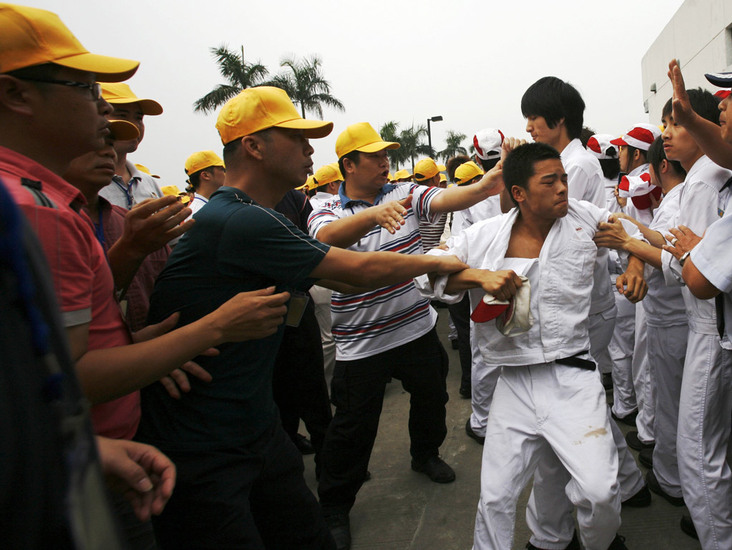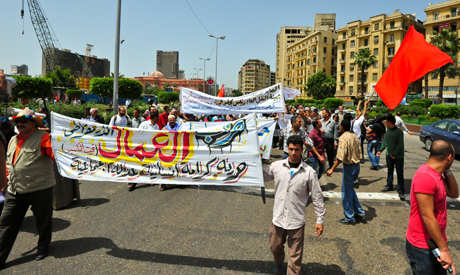trade unions
COSATU leader on South African and Israeli apartheid

Address by Zwelinzima Vavi, general secretary of
Eyewitness reports: The 99% occupy Wall Street; The Battle of Brooklyn Bridge; Unionists join in

Photo courtesy of Flickr.com/AdrianKinloch.
[For more on Occupy Wall Street, click HERE.]
By Pham Binh, New York City
October 5, 2011 – First appeared at the Indypendent, posted at Links International Journal of Socialist Renewal/Green Left Weekly with the author's permission -- The entrapment and arrest of 700 peaceful Occupy Wall Street (OWS) activists on the Brooklyn Bridge has created a huge wave of support for their movement. The number of daytime occupants in Liberty Plaza doubled or tripled from 100 the week prior to 200-300 this past Monday and Tuesday (October 3 and 4).
These people are the core who maintain the occupation of the plaza, making it possible for several hundreds and sometimes thousands to hold rallies in the late afternoon and participate in the open-mic speakouts and general assembly meetings in the evening.
Trade unions must join the fight against climate change

Ian Angus speaking at the Climate Change Social Change conference. Photo by Alex Bainbridge.
September 29, 2011 -- Climate and Capitalism, posted at Links International Journal of Socialist Renewal with permission -- Ian Angus, editor of Climate and Capitalism, is currently in Australia to speak at the Climate Change Social Change conference in Melbourne, September 30 – October 3.
During his pre-conference speaking tour, he was invited to address several meetings of trade union members. The following is a lightly edited transcript of the opening comments he made at union meetings in Melbourne and Geelong.
[For more articles by Ian Angus, click HERE.]
* * *
Thank you for inviting me to speak today.
Should China create a law on workers' strikes?

State-backed "trade union" officers (in yellow caps) harrass striking workers at the Nanhai Honda plant in 2010.
July 20, 2011 -- China Labor News Translations, posted at Links International Journal of Socialist Renewal with permission -- Even though strikes frequently occur across China, the country actually has no law regulating labour strikes. There is no law permitting strikes, but at the same time there is no law banning them.
Swaziland: Urgent action needed: Trade unionists arrested; COSATU condemns arrests

May 14, 2011 -- The Swaziland Democracy Campaign has just received urgent news that a group of leading trade unionists have been arrested by the security police in the Lubombo Region of Swaziland. The comrades were attending a meeting to discuss the establishment of a regional division of the Trade Union Congress of Swaziland (TUCOSWA) the new democratic trade union federation that was launched on May Day this year, and which brings together all the trade unions in Swaziland into a historic single organisation.
Those arrested include the following:
Israel: Histadrut unmoved by Arab winds of change

Members of the Workers Democratic Party march through Tahrir Square on May Day, 2011. Photo by Mohamed El Hebeishy/ahramonline.
Luxembourg: Class struggle in a ‘haven of peace and social progress’

Steelworkers protest outside in the Luxembourg headquarters of ArcelorMittal, May 2009.
By Murray Smith
South Korea: Irregular and migrant workers continue their daily struggles

February 8 rally at Yonsei University by irregular cleaning staff.
By Roddy Quines
March 20, 2011 – Links International Journal of Socialist Renewal -- This is to update my article published in Links International Journal of Socialist Renewal on January 14, 2011. There are a number of victories to report. These victories show the power of diligent action and solidarity in overcoming injustice. They also serve as evidence that direct action is an effective way to get results. There are some new struggles to report, and hopefully these struggles can also generate positive results. The struggles in this article are just a few of the many across the country being fought by “irregular” workers.
The European workers' movement: dangers and challenges

In Portugal, November 2010 general strike called by the Communist Party-led CGTP and the